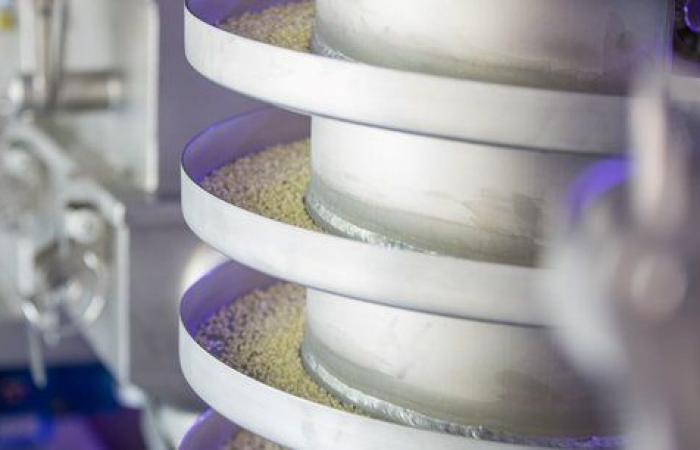More than 450 million tonnes: this is the quantity of plastic produced in 2019 alone according to the OECD. An astronomical figure which has doubled in less than 20 years and could exceed 700 million tonnes by 2040 without a strong coercive policy, the organization projects.
Faced with these results and supported by developing legislation, certain actors are looking for alternatives. That of recycling in the first place, confirms Sylvie Charrel, director of operations of the Polymeris competitiveness cluster, dedicated to rubbers, plastics and composites, who mentions “a large demand for recycled raw materials due to regulations”.
Plastic recycling: why manufacturers are hitting the brakes
« Polymers have made enormous progress in recycling. For example, company 1-08, which recycles internet boxes, obtains a pellet very close to its initial state. », explains Bénédicte Durand, president of the Altheora group and the professional union for the plastics and composites sector, Polyvia, in Auvergne Rhône-Alpes. Region which hosts a significant proportion of companies in the sector, explains Simon Gourgaud, director of territorial public affairs and partnerships of the union, with the Plastics Vallée, in Oyonnax (Ain), as its epicenter.
A wealth of alternatives
Beyond recycling, multiple alternatives are emerging on the production front, via biopolymers, biosourced polymers or the creation of new materials. The Lyon-based Reus-eat thus replaces disposable tableware with solid, reusable cutlery made from beer spent grain, a co-cereal product which has another advantage, that of being compostable.
Greentech Lactips wants to export its plastic made from milk protein
HAS a few kilometers, the Loire-based Lactips, which has just raised 16 million euros, has been developing for ten years a water-soluble and biodegradable polymer made from proteins naturally present in milk: casein. A characteristic which gives barrier properties to the paper and offers the solution, protected by eight patents, multiple outlets. The first being the packaging market.
The Belgian Futerro also illustrates this shift towards plastics of plant origin. For an investment of 500 million euros, the industrialist from the flat country will build, in the heart of the petrochemical complex of Port-Jérôme in Seine-Maritime, what is presented as “ the first biorefinery in Europe ».
Ready to invest half a billion in France, Futerro regrets going “under the radar of Paris”
Deliverable in 2027, the factory will be the twin of the one the group already operates in China. It will produce 75,000 tonnes of biosourced PLA (polylactic acid) plastic pellets that are recyclable and industrially compostable. “ This transition from fossil carbon to plant chemistry goes in the direction of history. This is the way forward for European industry », deduces Frédéric Van Gansberghe, CEO of Futerro. This call for fresh air is illustrated by the long list of initiatives in this area: Dionymer in Bordeaux, the motorist Forvia via its Matéri’Act sector near Lyon or even Barksem in Brazil, to name but a few.
Automotive: Materi’Act (Forvia) wants to accelerate the supply of biosourced materials
The life cycle, a major issue
Industrialists are not the only ones to mobilize on the issue. The world of research is in unison. At Insa, for example, the Ademabio project aims to develop biopolymer films for the packaging industry that are compostable and methanizable. These innovations nevertheless present “ certain limits », underlines Laurent Massacrier, founder of Green Business & Consulting Company (GBCC), a consulting firm in bioplastics and environmental solutions. It calls for a clear distinction between two points: the origin of plastic, whether from fossil energy or not, and its life cycle (compostable, recyclable or not). Because “we can have a polymer derived from petroleum and biodegradable and conversely, a biosourced plastic which is not”. Which adds an additional layer of complexity to the subject. “It has to make sense on both axes,” he believes.
“Biosourced polymers have another constraint for clients, points to Sylvie Charrel. They must pay an additional tax, because there is no sector to recycle these materials, the volumes to be processed are not sufficient.” Sylvie Charrel nevertheless mentions the Futerro project which could respond, to a certain extent, to this issue. The Belgian company has, in fact, chosen to add a chemical and mechanical recycling unit to its factory.
Île-de-France: how the Chevreuse Valley transforms biowaste into energy
The development of this new generation of polymers will also require communication around the sorting that must be done. Another downside pointed out by Bénédicte Durand: the difficulty of using non-petrochemical products in certain areas such as “medical or food for example, for which plastic often has safety benefits”.
The issue of financing and costs
Added to this is another, much more crucial question: will customers agree to bear the additional cost of these new products? Not so sure. Because if potential customers “require more and more information, they have difficulty accepting the prices of biosourced or recycled products”, note in tandem Sylvie Charrel and Bénédicte Durand. In this sense, “ regulation can sometimes be an asset », slips the latter which nevertheless underlines a tendency towards overtransposition in France.
Finally, there remains the most fragile point to encourage the arrival of new materials: public impulse. Starting with the financing of R&D projects which is necessary while adjustments to the Research Tax Credit (CIR) are underway. The president of Polyvia in Auvergne-Rhône-Alpes emphasizes the importance of this system. It’s a competitiveness issue, insists Simon Gourgaud. “We are not late but several countries are working on this subject. And their decision-making process is faster” agrees Laurent Massacrier. Which also calls for more clarity on the policies decided.
Budget: the government and MPs ready to cut the research tax credit
A reference to the decree of 2023, taken from the Agec law of 2020, which prohibited plastic packaging of fruits and vegetables whose packaging was less than 1.5 kilos and which was reaffirmed by the Council of State at the beginning of November. With the risk, if reversals multiply, of damaging the confidence of manufacturers.






